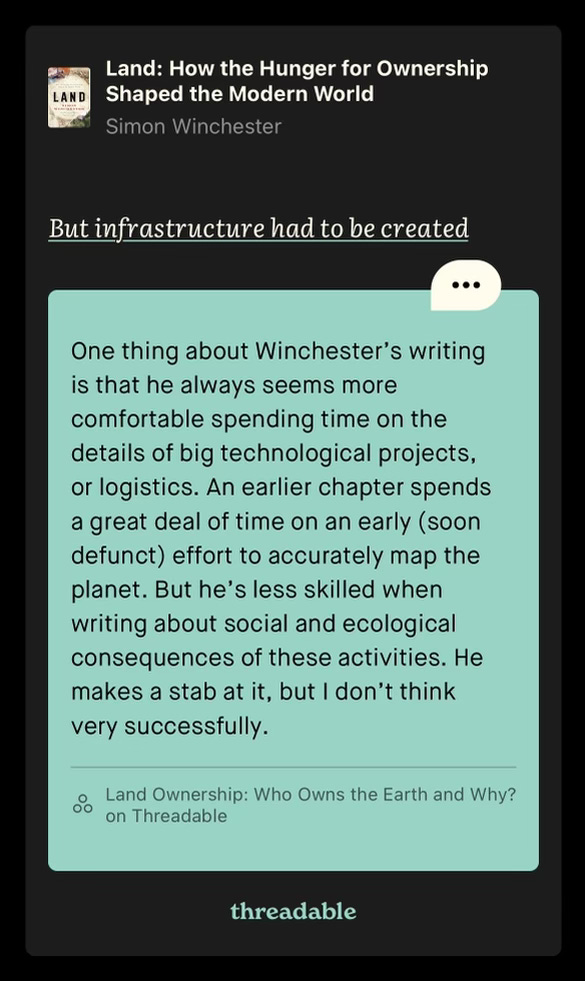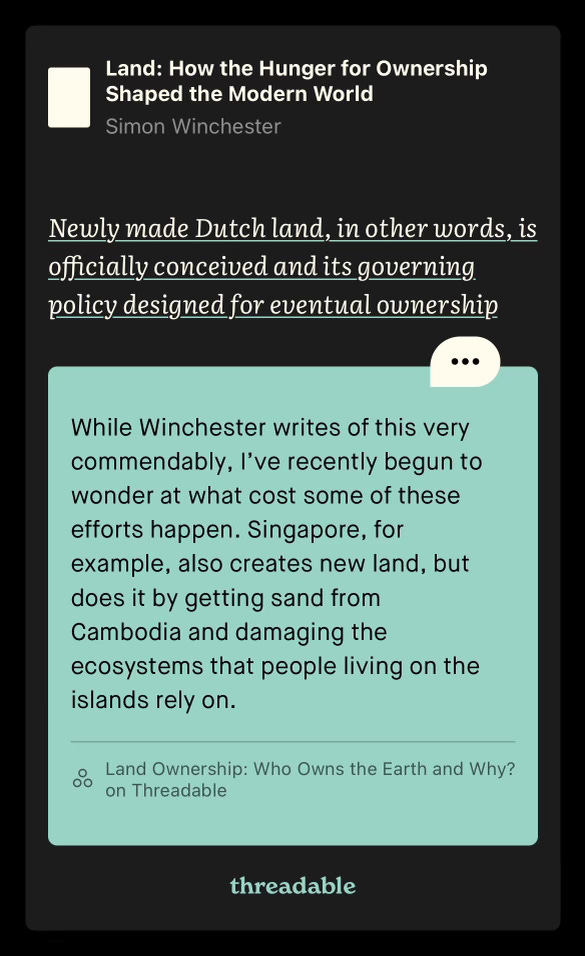Last week’s Threadable reading* was a selection from Simon Winchester’s book Land: How the Hunger for Ownership Shaped the Modern World: pages 101-121 (Part II: Chapters 1 and 2).
*(https://threadablenative.page.link/Rxp8yegeZ1vXy4u19 if you want to try Threadable and need the link! Only works on iOS/Apple devices for now. For anyone new to On the Commons, an overview of this 12-week project is here.)
This book is not on archive.org nor is there a preview on Google Books or anywhere else that I can find. But I’m sure it’s widely available in libraries if you would like to read the selection.
I wasn’t originally going to include Land in my Threadable selections, mostly because I deeply disliked the book. (I am working on a review of it that will explain why more fully, and will share that later this week or early next. Generally I’m a Winchester fan, but am wondering if I’d think differently of his earlier books now.) But it does go into detail about a number of land ownership and theft injustices that few others have written about, which makes it important on its own, even with its flaws: the theft of land owned by Japanese-Americans when people were forced into camps during World War II, for example, and Stalin’s forced collectivization in Ukraine that resulted in millions starving to death in the Holodomor.
The reading from Land is a crossover selection that is also going to be used in Mike Sowden’s upcoming Threadable circle on geology (he’s currently doing one on colors, or colours since he’s British, and the Rebecca Solnit selection he chose from The Faraway Nearby was breathtaking; what a writer she is). The section we chose is mostly about the Netherlands and the country’s long life in the face of a sea that wants to swallow it.
Winchester begins by discussing what he calls “new” land, such the island of Surtsey off the coast of Iceland that appeared in 1963; and the many islands frequently created in the Kingdom of Tonga.
It quickly moves to human-created habitable land, like Battery Park City in New York City and the fill that turned Stonecutters Island near Hong Kong into not-an-island. I often think of parts of Boston that I used to walk a lot when I lived there, all of which were built on fill-in land. I never liked Boston much (sorry!), but liked to wander that area because a great-grandmother (or great-great, I forget) of mine once lived there and went to the Episcopal church. She seemed to have a thing for the priest, judging by the clippings in her scrapbook. Though by “a thing,” I mean she seemed very inspired by his sermons.
The bulk of this selection from Land is about the Netherlands, though, and its centuries-long efforts to keep its lands . . . land. That is, solid ground. Especially over the last century—Winchester’s most focused writing here is on the dam built to wall off the Zuider Zee and bring in people to populate and farm the newly available land. He goes into a fair bit of detail on how important it was that the land not just be populated, but privatized, and by the “right” kind of people, though he never really talks about what that means aside from a religious balance that reflects the country’s split between mostly Catholic and Protestant.
This reading selection demonstrates many of Winchester’s strengths, as well as his weaknesses. As I commented within Threadable, he’s at his best when describing these kinds of big technological projects—it’s what made The Map That Changed the World such a compelling read—but turns out to be on less solid ground when talking about impacts of these activities and choices on people and the rest of an ecosystem.
Which also brought to mind something I think about maybe far too often, which is how Singapore is slowly growing in physical size by mining sand from Cambodia, putting the lives and livelihoods and ecosystems of many Cambodian islanders at risk. (That link is to a 16-minute documentary on Aeon, well worth watching.) What does it means to “reclaim” land? Or to build “new land”? At whose cost? Not just human, but everything.
It was interesting to read about the work on the Zuider Zee and Holland’s polder system that refers specifically to land “reclaimed” from a river or the sea. What I found myself stumbling over was a lot of human-centric language and assumptions about what “progress” really means, so some questions I’ll leave you with:
What do we mean by “reclaimed” land? It seems obvious that it means “land humans couldn’t previously live on permanently but now can,” but how would we think about this with a deeper understanding of ecology and how we might live within ecosystems?
Winchester barely touches on how climate change might affect some of the places he discusses (having been through the book process, I did wonder if his editor prompted these questions and he squeezed in some thoughts), but it’s worth talking about more. How much do you invest—with time, money, materials, and energy—into keeping nature at bay?
That’s it! I’m going to be spreading these readings out just a touch more—more like 10 days rather than a week apart. Please tell me if you’d like even more space between these posts, too. There’s no deadline. This isn’t a class or a course. Land ownership will be here, unfortunately, long after I’m dead. And nobody benefits when I dictate a reading pace.
My part of Montana has turned snowy and bitterly cold. Just the way I like it. Unfortunately, it also resulted in a lot of broken tree limbs, downed trees, and power outages. A mixed bag. I hope wherever you are reading this, you have weather that breathes life into you.







https://www.harvard.com/book/gaining_ground_a_history_of_landmaking_in_boston/
Always engaging Antonia. As a person in another ecosystem without easy access to the reading material I am a bit like the neighbors of the Dutch or Singapore :)
I love the author Winchester also and have enjoyed his writing. Land recovery is an interesting issue as an aside. I did a post about the Dutch but will not link here as I consider it bad form :( I consider the flipside of the Dutch expertise and offer that Bush 42 REFUSED the assistance of the Dutch after a major hurricane to rethink how we might manage Gulf Coast storms. The Dutch built the Zuider Zee for less than the cost of one storm, hurricane Harvey that affected Houston.
Singapore, a country EXISTENTIALLY threatened by sea rise has invited the Dutch as PARTNERS to collectively harden their nation against an uncertain future. My POV is the pivot to rapid sea rise is now within our lifetimes after a VERY SLOW rise the previous 60 years. Places like Cambodia and the struggling third world will weather the worst of the consequences by the mid 2030s while the rich world will be able to build its way out of it at least for perhaps 20 years.